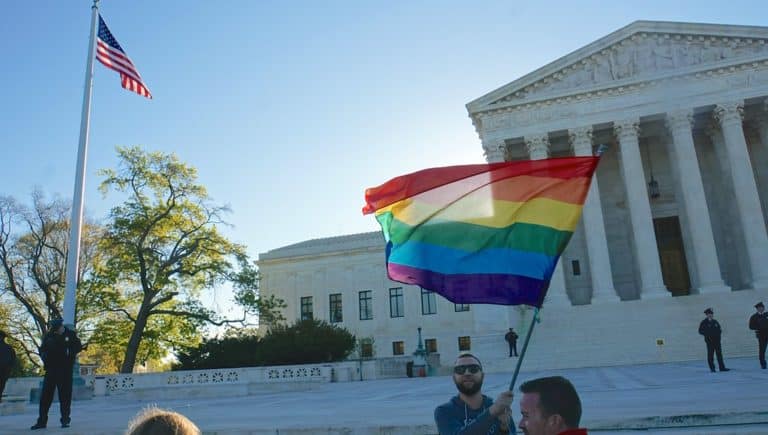On the heels of the London Transit Authority announcing that it will revoke Uber’s operating license, Uber has decided to leave Quebec rather than comply with new training regulations. Quebec planned to increase the minimum training for Uber drivers from 20 hours to 35 hours, bringing the requirement in line with training requirements for Montreal taxi drivers. “The province also wants criminal background checks on Uber drivers to be made by the police rather than by private firms. It will also require mandatory, annual vehicle inspections.” The general manager of Uber Montreal stated at a news conference that Quebec’s minister was “attempting to impose old rules on a new model.” Rules that he called “major changes.” He also said that he believed Uber could provide the training the government wants in less time through “technology.” Uber has about 10,000 drivers in Montreal.
Mark Joseph Stern at Slate breaks down the arguments heard by the 2nd Circuit yesterday in Zarda v. Altitude Express, Inc. The case concerns whether Title VII of the Civil Rights Act of 1964, which bans employment discrimination “because of sex,” also bars discrimination because of sexual orientation. Under President Obama, the Department of Justice took no position as the EEOC weighed in on behalf Zarda, arguing that Title VII does indeed bar employers from discrimination on the basis of sexual orientation. Under President Trump, the Department of Justice filed an unsolicited brief with the 2nd Circuit arguing the exact opposite.
Equifax CEO Richard Smith is no longer CEO, although it is unclear whether he was fired or resigned – the Equifax board has given themselves the option to retroactively decide that he was fired “for cause.” Mr. Smith “will not receive a bonus in 2017 and will serve as an unpaid consultant to the company for up to 90 days.” He will retain about $18.4 million in pension benefits. Mr. Smith was set to appear at two Congressional hearings next week about the data breach. Equifax indicated through a spokesman that Mr. Smith still plans to attend and cooperate with Congress.
The International Brotherhood of Electrical Workers Local Union 98 (IBEW) said it is preparing to file a lawsuit against pharmaceutical companies that have contributed to the growing opioid crisis. The lawsuit comes after the Philadelphia-based union lost eight members in the last eleven months to opioid addiction. Earlier this year the Union changed its opioid prescription policy to limit an opioid prescription to just five days for any pain or injury, but it took the Union almost two years of wrangling with their insurance company to make the change.
Federal Reserve Chairwoman Janet Yellen announced that the Fed plans to raise its benchmark interest rate, citing the tight labor market. “Ms. Yellen said that increasing competition for workers was driving up wages, and inflation was likely to follow.” The New York Times notes that “[t]he economic mystery is that inflation has remained low despite the tightening labor market.”
However, the worker shortage is hitting seasonal industries harder than ever. The Boston Globe details how business owners from the Cape to Maine are dealing with cuts and delays in seasonal visas that they have relied on for years to find workers to fill jobs American workers rarely apply for. The shortage is only expected to get worse next year as the Trump administration considers major reductions in the J-1 visa program.
Finally, if you can’t say anything not sexist, then best not to say anything at all.







Daily News & Commentary
Start your day with our roundup of the latest labor developments. See all
February 8
The Second Circuit rejects a constitutional challenge to the NLRB, pharmacy and lab technicians join a California healthcare strike, and the EEOC defends a single better-paid worker standard in Equal Pay Act suits.
February 6
The California Supreme Court rules on an arbitration agreement, Trump administration announces new rule on civil service protections, and states modify affirmative action requirements
February 5
Minnesota schools and teachers sue to limit ICE presence near schools; labor leaders call on Newsom to protect workers from AI; UAW and Volkswagen reach a tentative agreement.
February 4
Lawsuit challenges Trump Gold Card; insurance coverage of fertility services; moratorium on layoffs for federal workers extended
February 3
In today’s news and commentary, Bloomberg reports on a drop in unionization, Starbucks challenges an NLRB ruling, and a federal judge blocks DHS termination of protections for Haitian migrants. Volatile economic conditions and a shifting political climate drove new union membership sharply lower in 2025, according to a Bloomberg Law report analyzing trends in labor […]
February 2
Amazon announces layoffs; Trump picks BLS commissioner; DOL authorizes supplemental H-2B visas.